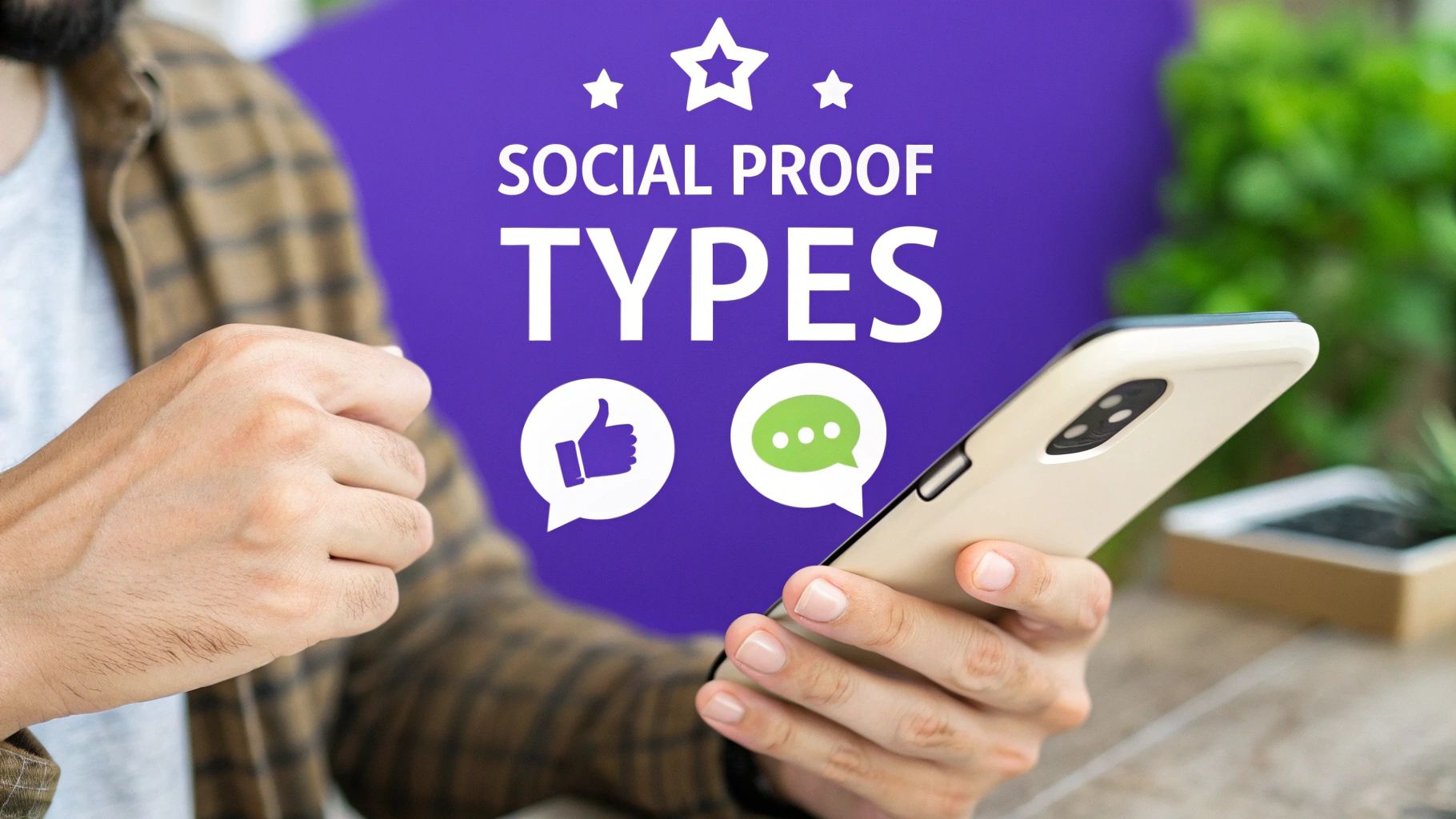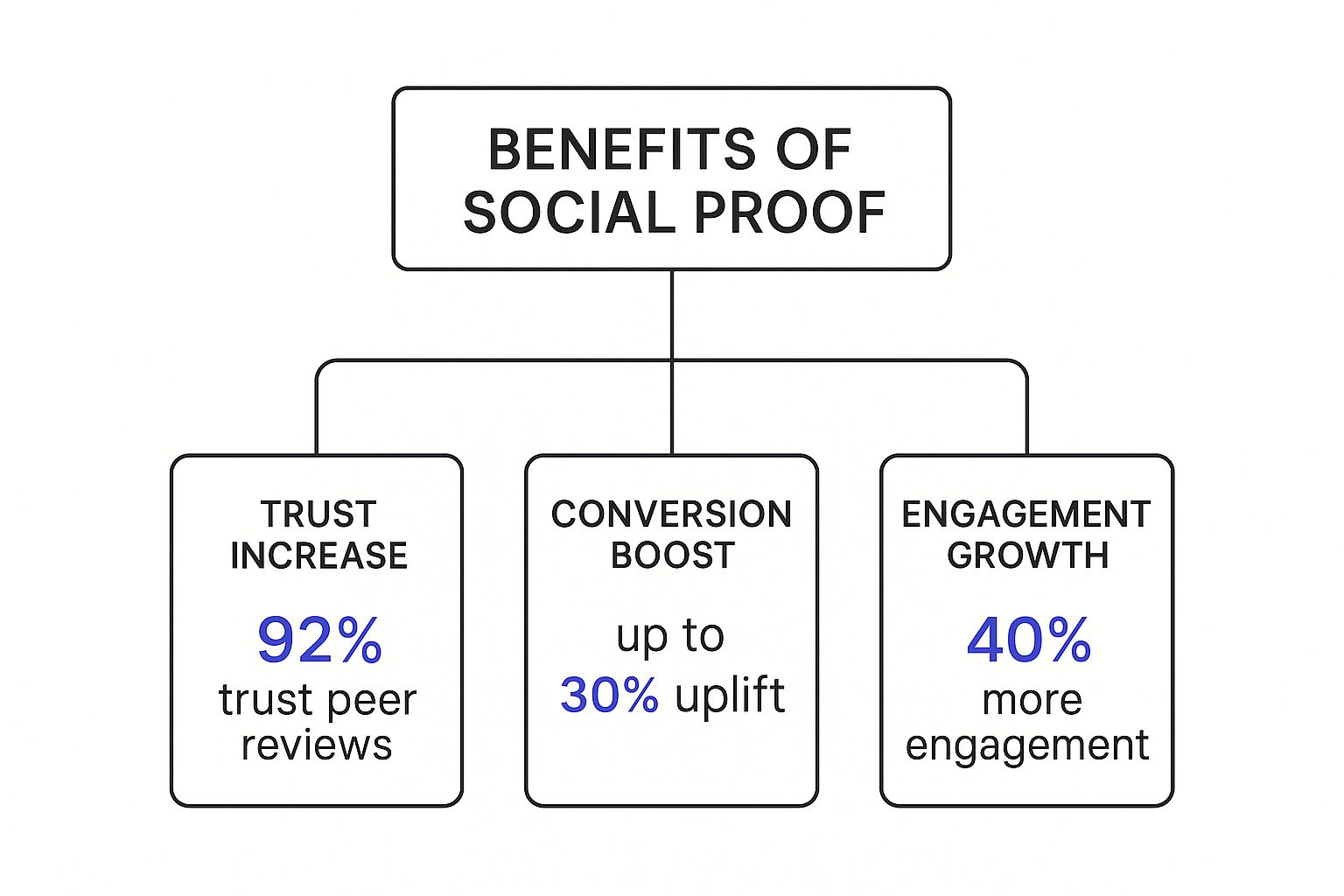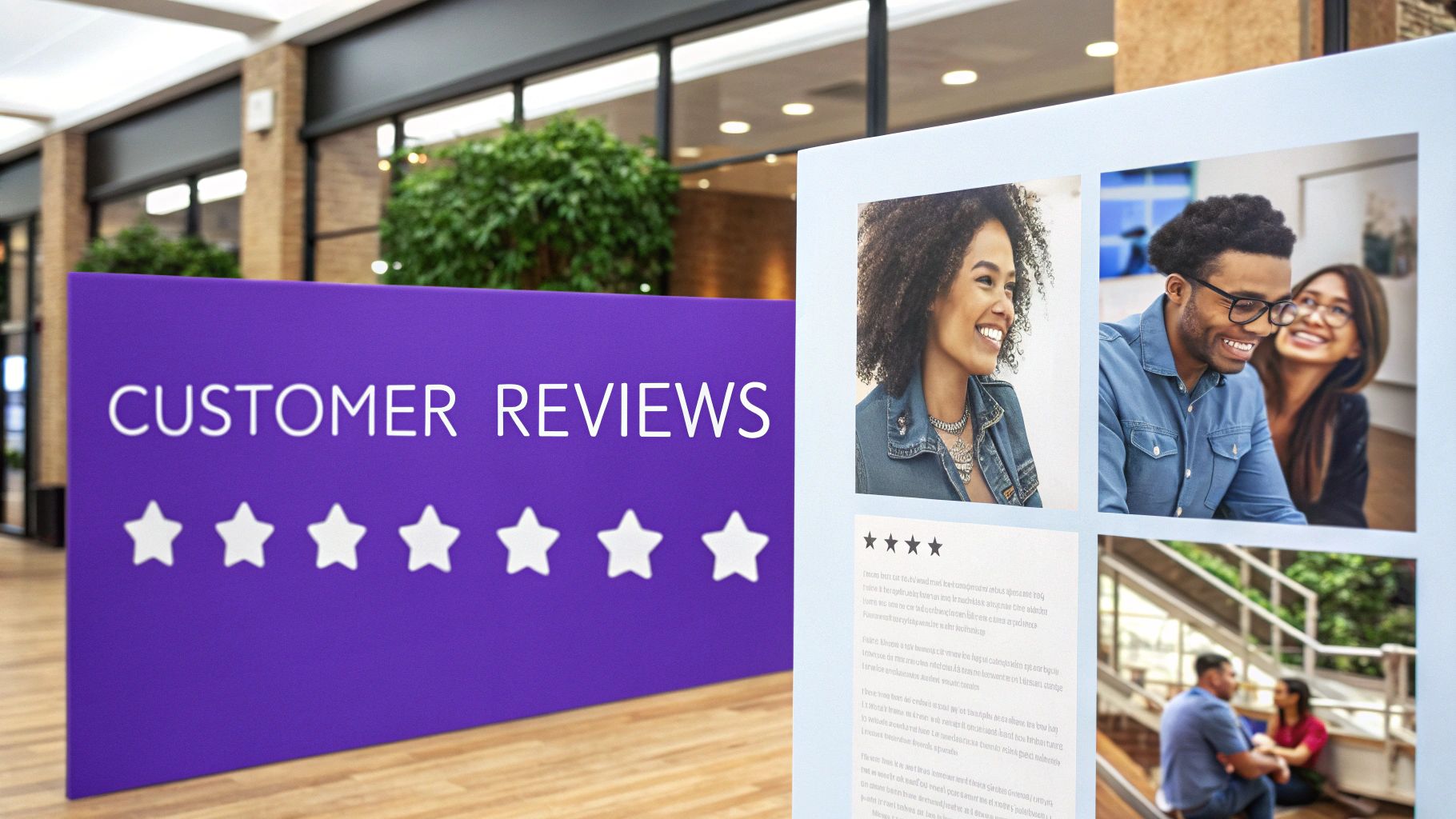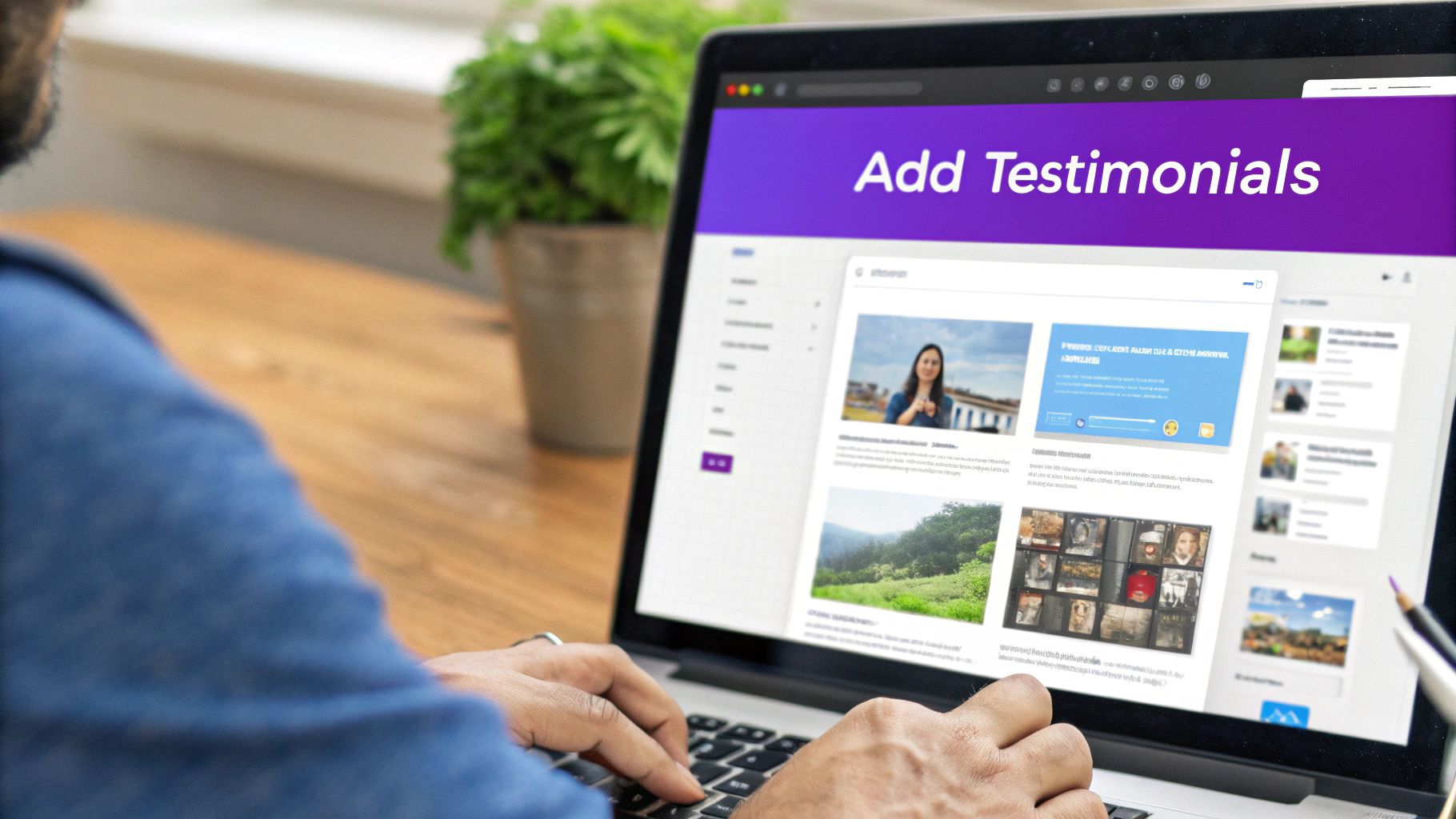What Is Social Proof in Marketing? Boost Trust & Conversions
Learn what is social proof in marketing, how it builds trust, and see real examples to enhance your marketing strategy. Discover the secrets today!
Posted by
Ever walked past two restaurants, one buzzing with people and the other completely empty, and instinctively felt the busy one must be better?
That’s social proof in its purest form.
It's that powerful, almost subconscious nudge we feel to follow the crowd. When we’re unsure about a decision, we look to what others are doing, thinking, or saying, and assume their collective wisdom is the right path. It’s a mental shortcut, and it’s one of the most potent tools in a marketer's toolkit.
Understanding Social proof in Modern Marketing
Let's be clear: social proof isn't just another marketing buzzword. It's a deep-seated part of human psychology. At its core, it’s all about validation. When a potential customer is on the fence, they hunt for external signals—reviews, testimonials, celebrity endorsements, you name it—to feel confident they're making the right choice. This instinct is practically hardwired into our brains.
Think of it like a street performer's tip jar. An empty jar tends to stay empty. But a jar with a few bills already in it? That sends a signal: "other people thought this was worth paying for," which encourages more people to tip. It’s the same exact principle in marketing.
Social proof works because it taps into our fundamental need to belong and make smart choices. It effectively outsources the tough parts of decision-making to the group, slashing the perceived risk for the individual consumer.
Why It Builds Instant Credibility
This is where social proof really shines. It sidesteps the natural skepticism we all have toward traditional advertising. It's one thing for a company to shout from the rooftops about how great its product is. It's another thing entirely to see hundreds of real, happy customers saying the same thing.
This shift from brand-led messaging to customer-validated claims is what builds genuine trust. To see this in action, just look at the powerful strategies for hotel reputation management, where entire businesses thrive or fail based on the trust built through guest reviews and ratings.
This reliance on peer experience creates a powerful, self-perpetuating cycle:
- Visibility: A product with tons of users or glowing reviews naturally gets noticed more.
- Credibility: All that visibility acts as a beacon, signaling quality and trustworthiness to new prospects.
- Adoption: Reassured by this proof, new customers feel confident enough to make a purchase.
- Reinforcement: Their great experience then adds to the growing mountain of social proof, pulling in even more customers.
By getting a handle on the different forms of social proof, any business can start strategically weaving it into their marketing to build that all-important credibility. We actually break this down even further in our complete guide to social proof marketing.
Key Elements of Social Proof at a Glance
To tie it all together, social proof isn't just one thing; it's a combination of psychological triggers and marketing tactics.
Here's a quick look at the core concepts and how they directly impact your marketing efforts.
| Concept | Description | Marketing Impact |
|---|---|---|
| Uncertainty Reduction | People look to others when they are unsure, assuming the group's actions are the correct ones. | Reduces purchase anxiety and friction, making it easier for new customers to say "yes." |
| Informational Influence | We accept information from others as evidence about reality, especially from experts or large groups. | Expert reviews, industry awards, and high user counts build authority and position a brand as a market leader. |
| Normative Influence | The desire to fit in and be liked drives us to conform to group norms and behaviors. | User-generated content and testimonials create a sense of community and make non-customers feel like they're missing out. |
| Similarity (Implicit Egotism) | We are more influenced by people who are similar to us in demographics, interests, or situations. | Relatable case studies and testimonials from peers resonate more deeply and feel more authentic to target audiences. |
Ultimately, these elements work together to create a powerful narrative: "People like you love this product, and you will too."
The Psychology That Drives Our Decisions

To really get why social proof works in marketing, you have to look past the tactics and peek inside the human brain. This isn't some clever trick marketers invented; it's a fundamental part of how we’re wired to make decisions and navigate the world. We're social creatures, constantly looking for cues from others to figure out what's safe, what's smart, and what's worth our time.
At its core, this whole phenomenon is powered by two massive psychological forces: informational influence and normative influence. These two concepts are the secret sauce behind why seeing other people do something makes us want to do it, too.
The Need to Be Correct
Informational social influence is all about our deep-seated desire to be right. When we're unsure about something or don't have enough information to make a call, we instinctively look to others for clues. The logic is simple: if a bunch of people are doing it, they probably know something we don't.
Think about choosing a new software for your company. The options are endless, and the features are confusing. But then you see that 95% of Fortune 500 companies use a specific platform. Suddenly, the choice feels a lot clearer and less risky. Their collective action acts as a powerful signal that this is the right choice.
This is exactly why hard data and evidence are so convincing:
- Case Studies: These aren't just stories; they're proof that a product delivers real results for someone else.
- Expert Endorsements: When a trusted industry leader gives their nod of approval, it tells us this choice is credible and correct.
- Big User Numbers: A large user base implies that a lot of people have tried it and found it valuable. It's safety in numbers.
When you offer this kind of proof, you’re not just selling a product. You're giving your customers a mental shortcut to feel confident they're making a smart decision.
When we're uncertain, we're hardwired to see the actions of others as the correct path. It's a shortcut that saves us a ton of mental energy, making it an incredibly potent psychological trigger.
The Need to Belong
The second force, normative social influence, taps into our primal need for social acceptance. We want to fit in, be liked, and avoid being the weird one out. This desire pushes us to conform to what our social circles are doing, whether that’s our friends, family, or the online communities we’re part of.
You’ve felt this before. You see a bunch of your friends raving about a new restaurant on Instagram, and suddenly you feel a pull to check it out. It’s not just about the food—it's about being part of the conversation and sharing an experience. Smart brands tap into this by building a sense of community around their products.
This is what makes user-generated content and testimonials from peers so incredibly powerful. When we see people "like us" using and loving a product, it sends a clear signal: choosing this will help us fit in. It transforms a simple purchase into a social act, an expression of belonging.
Exploring the Six Essential Types of Social Proof
Social proof isn't a one-size-fits-all strategy. It's more like a collection of specialized tools, each designed for a different job. If you want to build real trust and help customers feel confident in their decisions, you need to know which tool to pull out of the bag and when.
Think of them as different angles for telling your brand’s story—each one offering a unique and persuasive point of view. Let's break down the six core types of social proof marketers lean on to connect with their audience.
1. Expert and Celebrity Endorsements
This is the classic "stamp of approval" from someone people already trust. When a respected expert in your industry or a well-known celebrity gives your product a nod, their credibility instantly rubs off on your brand. It’s a powerful shortcut to building trust because it feels like they’ve done the homework for the consumer.
A dermatologist recommending a skincare line is pure expert social proof. A famous athlete lacing up a specific brand of sneakers is celebrity social proof. Both work by borrowing trust from a source that's already established and respected.
2. User Testimonials and Case Studies
This might just be the most authentic and relatable form of social proof out there. It comes straight from the people who use your stuff every single day—your actual customers. We're talking about written reviews, video testimonials, detailed case studies, and those star ratings you see on Google or Yelp.
Why does it work so well? Because we trust people like us far more than we trust a brand's own marketing message.
Of all the types of social proof, content from real users hits differently. To see how top brands are already nailing this, you can check out these awesome user generated content examples. When a potential customer sees someone just like them winning with your product, it’s incredibly convincing.
The image below breaks down just how powerful this kind of peer-to-peer trust really is, showing its direct impact on conversions and engagement.

The numbers don't lie. Fostering trust through real user reviews directly fuels your most important business metrics, making it a non-negotiable part of modern marketing.
3. Wisdom of the Crowd and Friends
Ever landed on a website and seen a banner shouting, "Over 1 million satisfied customers"? That’s the wisdom of the crowd at play. This tactic uses big numbers to signal that choosing this product is a safe, popular, and smart decision. It triggers a bit of FOMO (fear of missing out) and creates a feeling of widespread approval.
On the flip side, the wisdom of your friends works on a much more personal scale. When you see a friend or a connection on social media "like" a brand's page or mention they bought something, that recommendation carries serious weight. It’s digital word-of-mouth, and it’s often the most powerful driver of them all.
4. Certifications and Badges
Finally, certifications are all about displaying official seals, awards, or security badges that show your brand has met a certain standard. This could be anything from a "Best Place to Work" award to a "Google Certified Partner" badge or a secure checkout seal from a trusted payment company.
These little symbols are visual shortcuts that tell customers your business is legit, professional, and recognized by an authoritative third party. They're fantastic for calming nerves and building confidence, especially if your brand is still new or not yet a household name. And the impact is real—76% of marketers agree that social proof is a game-changer for boosting conversion rates.
How Leading Brands Master Social Proof

Knowing the theory is one thing. But seeing social proof in the wild? That’s where the real learning happens.
The world’s best brands don’t just use social proof—they weave it into the very fabric of their customer experience. They turn abstract psychology into tangible, trust-building machines that feel completely natural and incredibly persuasive.
Let's break down how the giants do it. It's not about copying them move for move, but about understanding why their tactics work so you can adapt those core principles for your own brand.
Amazon: The King of User Reviews
When you think of user-generated proof, Amazon is the undisputed champion. The entire platform is built on a foundation of customer reviews and star ratings.
Every single product page is a living, breathing testament to the power of peer experience. Shoppers can sift through detailed accounts from real buyers, filter by ratings, and see exactly what they’re getting into before they click "buy."
This accomplishes a few critical things:
- It Calms Purchase Anxiety: Seeing a product with thousands of four and five-star reviews makes it feel like a safe bet. It quiets that little voice in a buyer's head asking, "What if this is a mistake?"
- It Forges Unbreakable Trust: Authentic reviews—both the good and the bad—create a level of transparency that traditional ads just can't compete with.
- It Answers Questions Before They're Asked: The Q&A section, powered by previous buyers, tackles specific concerns head-on, removing friction from the buying process.
The impact is massive. Data shows 93% of consumers say online reviews influence their purchase decisions. People trust people, and Amazon built an empire on that simple truth.
Netflix and the Wisdom of the Crowd
Netflix is a masterclass in using the "Wisdom of the Crowd."
Those "Trending Now" and "Top 10 in Your Country" lists are social proof in its purest form. They tap directly into our fear of missing out (FOMO). When we see a show is trending, our brain immediately interprets it as a signal of quality and cultural relevance. We don't want to be left out of the water cooler conversation, so we're far more likely to click play.
This simple feature transforms passive browsing into active discovery, all driven by the behavior of millions.
By highlighting what’s popular, Netflix doesn't just suggest content—it validates it. This creates a powerful feedback loop where popular shows get more views, which keeps them on the list, making them even more popular.
Beyond just reviews and trending lists, many top-tier brands build out a strong customer advocacy program. This approach is brilliant because it turns your happiest customers into your most vocal promoters, blending the raw trust of user proof with the wide reach of crowd wisdom to create a marketing engine that practically runs itself.
Integrating Social Proof Into Your Marketing Funnel

Knowing the types of social proof is one thing. But the real magic happens when you know where and when to use them.
Think of it like this: you wouldn't propose on a first date. In the same way, you can't just throw any random testimonial at a potential customer and expect it to work. The secret is to place the right proof at the right time, guiding people through their journey and building their confidence every step of the way.
It’s all about strategically weaving social proof into every stage of your marketing funnel—from that first "hello" all the way to the final click to buy.
Top of Funnel: Building Awareness
At the top of the funnel (ToFu), people are just discovering you exist. They're not ready for a hard sell. Your only job here is to grab their attention and establish credibility—fast. Social proof at this stage needs to be broad, impressive, and easy to digest in a single glance.
Think big numbers and recognizable names.
This is the perfect spot for influencer collaborations, big-name media mentions, and high-level stats. A simple banner on your homepage shouting "Featured in Forbes" or "Trusted by over 50,000 users" instantly signals that you're a serious player. It’s not about getting into the nitty-gritty details; it’s about making a powerful first impression that says, "Hey, we're legit. Stick around."
Middle of Funnel: Driving Consideration
Okay, you’ve got their attention. Now they're in the middle of the funnel (MoFu), actively weighing their options. A big number isn't enough anymore. They need to know if your solution can solve their specific problem. This is where detailed, relatable proof really shines.
Your focus should shift to in-depth validation that tells a story:
- Detailed Case Studies: Show exactly how a customer just like them got real, measurable results with your product.
- In-depth Video Testimonials: There's nothing more powerful than hearing a happy customer explain their success in their own words. It builds an instant emotional connection.
- User Reviews on Third-Party Sites: Don't be afraid to send prospects to unbiased review sites like G2 or Capterra. It shows you’re transparent and have nothing to hide.
This is your chance to back up your claims with hard evidence. The stronger the proof, the more likely they’ll choose you over the competition.
When a potential customer sees someone just like them succeeding with your product, it transforms an abstract promise into a tangible reality. This is the moment they start picturing their own success.
Bottom of Funnel: Sealing the Deal
You're almost there. At the bottom of the funnel (BoFu), your prospect is on the verge of making a decision. All they need is one final nudge to get over any last-minute hesitation. Social proof here acts as that final, reassuring whisper.
This proof needs to be placed at critical decision-making spots, like your pricing and checkout pages.
A short, punchy quote or a simple star rating right next to the "Buy Now" button can work wonders to reduce purchase anxiety. A testimonial like, "This was the best investment we made all year," might be all it takes to close the deal. There's a reason 75% of marketers report user-generated content improves marketing effectiveness—it injects trust and authenticity right when it counts the most.
Of course, to do any of this, you first need to get those powerful stories from your customers. For a complete walkthrough on how to do it without being awkward, check out our guide on how to ask for testimonials.
By systematically collecting and deploying social proof, you start turning casual browsers into converted customers.
Common Questions About Social Proof
As you start weaving these strategies into your marketing, a few questions always seem to pop up. Let's tackle them head-on, because understanding the nuances is what separates a strategy that builds trust from one that just creates noise.
Can Social Proof Backfire?
Absolutely. And when it does, it hurts.
Think about it: a product page riddled with one-star reviews is a flashing red warning sign. That's negative social proof in action, and it actively pushes people away. The same thing happens when you display a low follower count or just a handful of testimonials—it can signal that you're unpopular or unproven, making potential customers hesitant.
The trick is transparency. Don't hide from negative feedback. Address it, learn from it, and use it as a chance to show off your stellar customer service. Real, honest social proof—even if it isn't perfect—will always be more powerful than something that feels fake or forced.
Is Social Proof Just Peer Pressure?
It's a great question, but they're two very different things.
Peer pressure is about coercion. It’s that feeling of being pushed to do something you don’t want to do just to fit in or avoid being left out. It’s rooted in fear of social exclusion.
Real social proof, on the other hand, is about building confidence. It’s not about twisting someone's arm. Instead, it acts as a helpful guide, showing a customer that other people just like them have already made this choice and had a great experience. It doesn't force a decision; it just makes it feel a whole lot safer.
How Can a New Business Get Social Proof?
This is the classic chicken-and-egg problem, but you're not stuck. Even when you're starting from scratch, you can get creative and build that initial wave of credibility.
- Go for Expert Endorsements: Reach out to respected voices in your niche. Offer them your product or service for free in exchange for their honest feedback or a shout-out. One key endorsement can be worth a dozen regular reviews.
- Launch with Beta Testers: Before you go public, invite a small, dedicated group to be your beta testers. Their detailed feedback and insights can become your very first case studies and testimonials.
- Incentivize Your First Customers: Don't be afraid to offer a discount or a little something extra to your first 10-20 customers if they’re willing to leave a review. It’s a small price to pay for foundational social proof.
Getting those first few testimonials is a massive step. For a deeper dive, check out our complete guide on how to get customer testimonials to get the ball rolling.
Ready to stop chasing testimonials and start building trust automatically? EndorseFlow makes it simple to collect powerful customer stories and showcase them everywhere it matters. Start your free 14-day trial today!